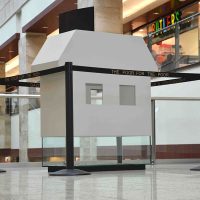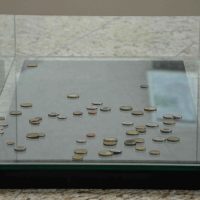Paradoxically this is more frequent in societies where free-market capitalism has had time to take deeper root. Simultaneously volunteering or donating money, a modern form of showing compassion for others (frequently people we don’t necessarily know who live halfway around the globe), is also more prevalent in these countries.
At first this might seem contradictory: doesn’t the material growth of one individual occur at the expense of another member of the community? While previously the natural desire to help others was focused on adversities in one’s own smaller environment, today many civil organizations have global networks.
Donating and the psychology behind it form the central theme of Erika Baglyas’s installation Think about Your Future Well in Advance! The artist designed her work specifically for the unique space of Park Gallery, located inside MOM Park.
The starting-point of the artwork is a house-shaped piggy bank, a child’s toy that was an accessory of almost every household during the Kádár era. The site-specific and situation-specific installation recalls this toy, taking the form of a child-size house that functions as a collection box into which you can drop money through the chimney.
The donations accumulate inside the house, and as in the case of so many other donations, at first we are unaware of the uses to which it will be put (apart from the immediate use of soothing our own conscience). Who will it benefit? When? and How much? The house, however, cannot be taken apart.
The money collected in it will forever be enclosed inside it as it becomes part of the artwork. The cordons that surround the house are inscribed with the phrases the poor for the poor / the poor for the rich / the rich for the rich / the rich for the poor.
The size of the collection box itself compels us to contemplate, what is the point of a house that is not large enough to be inhabitable? With this, the artist reflects on our tendency sometimes to make pointless purchases when we buy merchandise that only in a superficial manner resembles a practical, useful product.
But how do we define what is useful? Where do we draw the line if we consider that over the course of the past decades there has been a continuous improvement in the standard of living in consumer societies, a phenomenon that has also brought with it the constant reassessment of our needs and expenses.
The cordons, familiar to us from airports, banks and museums, form on the one hand a barrier between the artwork and the viewers, while also providing protection for the object. They allow us just close enough to let us drop a coin or a bill in the house.
The house shape can of course also be interpreted as a metaphor: banks swamp us with advertisements for various home-purchase savings accounts and mortgage possibilities, often specifically targeting young couples. The slogans are frequently variations on the phrase Think about Your Future Well in Advance! The desire to make a home for oneself is instilled in our heads at an early age with, among others, the board game Manage your Budget! (Gazdálkodj okosan!), which was familiar to several generations of Hungarians.
Games like these suggest that saving money for a home should be a high priority for everyone. The future, however, is a paradox that only exists in theory; to think about one’s future in the present finds manifestation in savings and the gesture of depriving oneself of momentary pleasures today.

